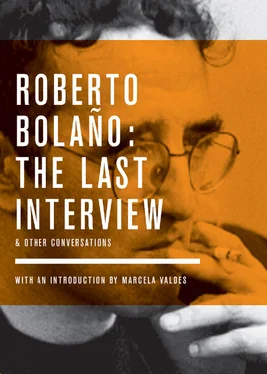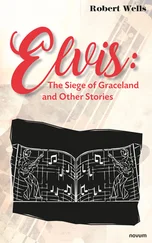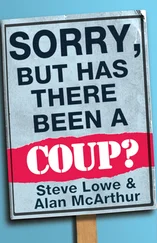IV. THE LAST INTERVIEW. INTERVIEW BY MÓNICA MARISTAIN
PLAYBOY, MEXICO EDITION, JULY 2003
In the blurry panorama of Spanish-language literature, a place where young writers each day seem more preoccupied with obtaining scholarships and plum posts at various consulates than contributing to artistic expression, the figure of a lean man stands out, blue backpack at the ready, enormously framed eyeglasses, a never-ending cigarette between his fingers and, whenever there is a shortage, sharp, blunt wit.
Roberto Bolaño, born in Chile in 1953, is the best thing to happen to the writing profession in a long time. Since becoming famous and pocketing the Herralde (1998) and Rómulo Gallegos (1999) prizes for his monumental The Savage Detectives , perhaps the great Mexican novel of our time, his influence and stature have grown steadily: Everything he says, with his pointed sense of humor, his exquisite intelligence, and everything he writes, with a sure pen, great poetic risk and profound creative commitment, is worthy of the attention of those who admire and, of course, those who detest him.
The author, who turns up as a character in the novel Soldiers of Salamis by Javier Cercas and is paid homage in Jorge Volpi’s last novel, An End to Madness , is a divider of opinions, like all brilliant men, and a generator of bitter antipathy, despite his tender good nature. His voice is somewhere between high-pitched and hoarse, and like any good Chilean, the one with which he responds is always courteous. He will not write one story more until finishing his next novel, which will be about the murder of countless women in Ciudad Juárez. He is already at 900 pages and not finished yet.
Bolaño lives in Blanes, Spain, and he’s very sick. He hopes that a liver transplant will give him the strength to live with the same intensity worshipped by those fortunate enough to address him in private. His friends say he sometimes forgets about his doctor’s visits because he’s writing.
At fifty years old, Bolaño has crisscrossed Latin America as a backpacker, escaped the clutches of Pinochet because one of his jailers was a classmate in school, lived in Mexico (a section of Bucareli Street will someday bear his name), got to know Farabundo Martí’s militants before they assassinated the poet Roque Dalton in El Salvador, kept watch over a Catalonian campground and sold costume jewelry in Europe. Also, he always stole good books because reading is not just a matter of posturing. He has transformed the course of Latin American literature. And he has done it without warning and without asking permission, the way Juan García Madero, adolescent antihero of his glorious The Savage Detectives , would have done: “I’m in my first semester of law school. I wanted to study literature, not law, but my aunt insisted and in the end I gave in. I’m an orphan and someday I’ll be a lawyer. That’s what I told my aunt and uncle, then I shut myself in my room and cried all night.” The rest — the remaining pages of the novel — has been compared to Julio Cortázar’s Hopscotch and even Gabriel García Márquez’s One Hundred Years of Solitude . In the face of such hyperbole, he might have said, “No way.” Thus, on this occasion, let’s get to what’s important: the interview.
MÓNICA MARISTAIN:Were you blessed with a kind of courage in life by being born dyslexic?
ROBERTO BOLAÑO:Not at all. There were problems when I played soccer, I’m left-handed; problems when I masturbated, I’m left-handed; problems when I wrote, I’m right-handed. So, as you can see, no significant problems.
MM:Did Enrique Vila-Matas remain a friend after the fight you had with the organizers of the Rómulo Gallegos prize?
RB:My fight with the jury and the organizers of the prize was due basically to their expectation that I blindly endorse, from Blanes, their choice without having participated. Their methods, transmitted to me by phone by a Chavista pseudo-poet, too closely resembled the deterrent arguments of the Casa de las Américas (Cuba). It seemed to me that eliminating Daniel Sadaor Jorge Volpiin the first round was an enormous mistake, for example. They said what I wanted was to travel with my wife and kids — something that was completely false. I suppose that from my indignation over this lie, a letter surfaced in which I called them neo-Stalinists, among other things. In fact, I was informed that they intended, from the beginning, to reward another author, who wasn’t Vila-Matas, whose novel seemed to me to be so good, and who without a doubt was one of my candidates.
A well known Mexican writer, Daniel Sada (b. 1953) is the author of Porque parece mentira, la verdad nunca se sabe (1999), a hybrid work of epic poetry and novel. His short story “The Ominous Phenomenon” appeared in the English-language collection Best of Contemporary Mexican Fiction (2009).
A Mexican author who helped start the break from magical realism, Jorge Volpi (b. 1968) is best known for his novels and essays. His major work is In Search of Klingsor (1999).
A Mexican novelist who enjoys commercial success, Ángeles Mastretta (b. 1949) is best known for her strong female characters and social commentaries. To Bolaño she represented something of the old guard of Latin American literature. Her major works are available in English.
MM:Why don’t you have air-conditioning in your studio?
RB:Because my motto is “Et in Esparta ego,” not “Et in Arcadia ego.”
MM:Don’t you think that had you gotten drunk with Isabel Allende and Ángeles Mastretta, someone else might be your double in terms of your books?
RB:I don’t believe so, first of all, because those women avoid drinking with someone like me. Secondly, because I no longer drink. Thirdly, because not even in my worst drunkenness have I ever lost the minimum lucidity, a sense of prosody and rhythm, or a certain rejection in the presence of plagiarism, mediocrity and silence.
MM:What is the difference between a writer and an author?
RB:Silvina Ocampo is one example of an author. Marcela Serrano is one example of a writer. You can measure light-years between one and the other.
MM:What makes you believe you’re a better poet than narrator?
RB:The degree to which I blush when, by mere chance, I open one of my poetry or prose books. The poetry books make me less embarrassed.
MM:Are you Chilean, Spanish, or Mexican?
RB:I am Latin American.
MM:What is your motherland?
RB:I regret having to give a pretentious response. My children, Lautaro and Alexandra, are my only motherland. And perhaps, in the background, certain moments, certain streets, certain faces or scenes or books that are inside me and that some day I will forget — that is the best one can do for a motherland.
MM:What is Chilean literature?
RB:Likely the nightmares of the most resentful and gray poet, and perhaps the most cowardly of all Chilean poets: Carlos Pezoa Véliz, dead at the beginning of the 20th century and author of only two memorable poems, but truly memorable indeed, who continues to suffer and dream of us. It’s possible — isn’t it? — that Pezoa Véliz is agonizing and has yet to die, and that his final minute has been rather long, and that we might all be inside of him. Or at least that all we Chileans are inside of him.
Читать дальше












